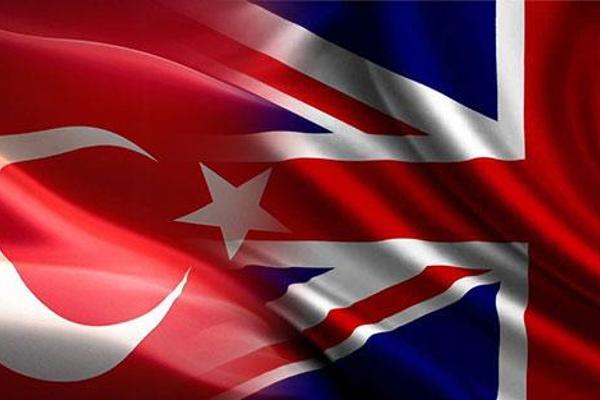FTA supports Turkey-UK trade target of $20 bln
ISTANBUL


The free trade agreement signed by Turkey and the United Kingdom on Dec. 29 will make the two countries’ bilateral trade target of $20 billion reachable, a top Turkish official said on Dec. 30.
After reaching the post-Brexit trade deal with the European Union last week, the U.K. signed the first free trade agreement with Turkey as a gesture that shows the strength of their commercial relations, Osman Okyay, head of the Turkey-U.K. Business Council of the Foreign Economic Relations Board (DEİK), told Anadolu Agency.
If the agreement had faced any delay, Turkey’s trade volume with Britain would suffer, he added.
Turkey could not be a part of the free trade agreement between the EU and the U.K., which necessitates the update of the customs union immediately, Okyay stated.
The free trade deal inked by Turkey and the U.K. will take effect from Jan. 1, 2021.
Without the deal, about 75 percent of Turkish exports to the U.K. would be subject to tariffs, causing losses of some $2.4 billion.
In 2019, Turkey’s exports to the United Kingdom – its second-largest export market behind Germany – stood at $11.3 billion, while imports totaled $5.6 billion.
The U.K.’s investments in Turkey are around $11.6 billion.
In the first 10 months of this year, Turkey’s exports to the U.K. reached $8.8 billion, while imports from Britain was just half of that volume - a trade plus of $4.4 billion for Turkey.
“We are taking the first step towards further deepening our ties while maintaining 25-year gains from the customs union,” Turkish Trade Minister Ruhsar Pekcan said at the signing ceremony on Dec. 29, referring to Turkey’s 1995 customs union deal with the EU from which Britain is making its final exit on Dec. 31.
On her part, British International Trade Secretary Liz Truss said both sides are eager to extend the deal to include services and other sectors, naming financial services, biotechnology, steel industry and automotive as areas having huge potential in bilateral ties.
The agreement will ensure integration to the rapidly changing global supply chains in the short term, said Ayşem Sargın, the head of the Istanbul-based International Investors Association (YASED).
“After this important stage, we have been attaching importance to extending the agreement between the two countries to include areas of investments and services,” she said.
Şekib Avdagiç, the head of the Istanbul Chamber of Commerce (İTO), hailed the agreement with the world’s sixth-largest economy, saying that it “opens a new era in Turkey’s foreign trade.”
“The agreement with the U.K. and other possible developments will force the EU, which is reluctant to update the customs union agreement, to think twice,” he added.
Turkey has been insisting on upgrading the EU customs union agreement, which does not cover sectors such as services and e-commerce, for several years. Under a 2016 deal, Turkey took steps to stem a tide of refugees, and the EU had pledged to take steps on visa liberalization and updating the outdated customs union.
Turkish automakers also expressed their appreciation of the free trade deal between Ankara and London.
“We will keep our advantage of exporting to this country without tariffs,” said Baran Çelik, the head of Uludag Automotive Industry Exporters’ Association (OİB).
Underlining that Britain is the top third export market for the Turkish automotive industry with a volume of around $2.2 billion this year, he said, “Without a deal, there would be customs barriers of 5 percent in supply industry exports and 18 percent in passenger and commercial cars.”
Ford Otosan, a joint venture of Turkey’s Koç Holding and U.S. giant Ford Motor, makes nearly 10 percent of Turkey’s exports to Britain.
“We believe that our trade volume with the United Kingdom will keep growing in the upcoming period with this agreement, which is vital in protecting the global reputation and competitive advantage of our automotive industry,” said Haydar Yenigün, the general manager of Ford Otosan.
In 2019, Turkish automotive companies directly sold 122,500 units in the U.K. market for $1.8 billion. With indirect sales conducted through third countries, Turkey’s auto exports to the U.K. were estimated at around $3 billion.
On the other hand, Turkey ranks second in Britain’s machinery exports and is the top fifth country for British auto exports.
